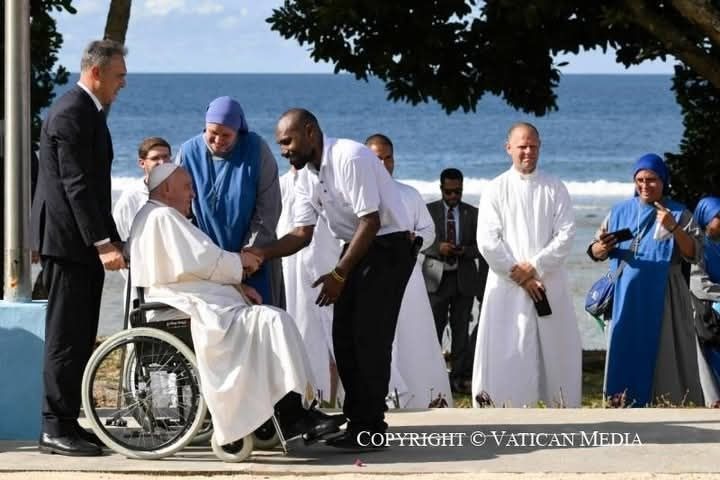Pope warns against Eurocentric Church, looks to springtime found in the East
In the general audience held today in St Peter's Square, Francis retraced the stages of the apostolic journey that in recent days has taken him to Indonesia, Papua New Guinea, East Timor and Singapore. "I met living communities that grow by attraction. It gladdened my heart to be able to spend some time with the missionaries and catechists of today’.
Vatican City (AsiaNews) - ‘In thinking about the Church we are still too Eurocentric. In reality, the Church is much larger than Rome and the West and more alive’. This was said today by Pope Francis addressing the faithful gathered in St Peter's Square for the Wednesday general audience.
As usual - in the first appointment following his apostolic journeys - Pope Francis wanted to take stock of the twelve days spent in Indonesia, Papua New Guinea, East Timor and Singapore. He stressed the specific character of these visits, which are journeys ‘to bring the word of the Lord, to make him known, and also to get to know the souls of the peoples, which is a very beautiful experience’.
He also said he reconnected on this trip to Paul VI, who in 1970 was the first pontiff ‘to fly to the rising sun’, visiting several Asian countries and going as far as the Samoa Islands. ‘I tried to follow his example,’ he commented, ’but, with a few years on him, I limited myself to four countries. I thank the Lord, who allowed me to do as an old Pope what I would have liked to do as a young Jesuit, to go as a missionary there'. But above all, Francis underlined the vitality of the Churches he met:
‘I experienced it in an emotional way,’ he said, ‘meeting those communities, listening to the testimonies of priests, nuns, lay people, especially catechists. Churches that do not proselytise, but grow by attraction’.
In Indonesia,' he said, “I have had confirmation of how compassion is the road on which Christians can and must walk to bear witness to Christ the Saviour and at the same time encounter the great religious and cultural traditions”.
Recalling the tunnel of friendship that connects the cathedral and the mosque, he commented: ‘There I saw that fraternity is the future, it is the answer to anti-civility, to the diabolic plots of hatred, war and even sectarianism’.
Of Papua New Guinea he cited the ‘beauty of a missionary, outgoing Church’. Citing the more than eight hundred languages spoken, he described them as ‘an ideal environment for the Holy Spirit, who loves to make the message of Love resound in the symphony of languages’.
‘It gladdened my heart to be able to spend some time with today's missionaries and catechists,’ he added, citing his visit to Vanimo, where ’missionaries are between the forest and the sea and go to seek out even the most hidden tribes. He relaunched the challenge of a true encounter with these peoples because ‘faith must be inculturated and cultures must be evangelised’.
On East Timor, he recalled how in this country the Church has ‘shared the process of independence with all the people, always orienting it towards peace and reconciliation. It is not a question of an ideologisation of faith, no, it is faith that becomes culture and at the same time enlightens, purifies and elevates it’.
But above all, the Pope said he was ‘struck by the beauty of that people: a people tried but joyful, a people wise in suffering. A people that not only generates many children, but teaches them to smile. And this is a guarantee for the future. In East Timor I breathed the air of spring'.
Finally Singapore, ‘a country very different from the other three: a city-state, very modern, the economic and financial hub of Asia and beyond’. Where Christians ‘are a minority, but still form a living Church, committed to generating harmony and fraternity among the different ethnic groups, cultures and religions.'
'Even in wealthy Singapore there are the ‘little ones’,’ the Pontiff observed, “who follow the Gospel and become salt and light, witnesses of a hope greater than that which economic gains can guarantee”.
Renewing his thanks for the welcome received, Francis asked God to bless these peoples and guide them on the path of peace and fraternity.
The Pontiff then once again called everyone to prayer for peace during his greetings to Italian-speaking pilgrims: ‘Let us not forget that war is a defeat,’ he said, ‘Let us not forget Palestine, Israel, the tormented Ukraine, Myanmar and so many places where there are ugly wars. May the Lord give us all a heart that seeks peace’.
Francis also recalled the World Day for Alzheimer's sufferers, which will be celebrated on Saturday 21 September: ‘Let us pray that medical science will soon be able to offer prospects for a cure for this disease and that more and more interventions will be activated to support sufferers and their families’.
Earlier - before starting his speech - he had called two of the Vatican employees who had read the translations into the different languages to introduce themselves to the pilgrims and announced that they would be getting married next Saturday. ‘It is beautiful to see when love brings us forward to make a new family,’ he had commented, ’I wanted to present them to thank the Lord.
07/02/2019 17:28
12/02/2016 15:14







.png)










